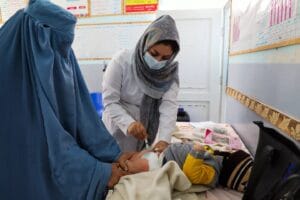Creating a Healthier Future: Collaborating on Policies and Education to Promote Healthy Lifestyles
As First Lady Jill Biden stated, “We must all do our part to promote healthy living, and Lifestyle Lifespan has a unique opportunity to lead the way.”…

These days, numerous reports, such as “Alarming Projection: By 2035, More Than Half of the Global Population Will Be Obese”, have sparked concern among experts and public officials alike. According to the report, the rising obesity rates could lead to a significant increase in non-communicable diseases, with devastating consequences for individuals and the economy.
Dr. Tedros Adhanom Ghebreyesus, Director-General of the World Health Organization (WHO), expressed his concerns, stating, “The world is on a dangerous trajectory, and we need to act now to reduce the impact of obesity on our health systems and economies.” He called for urgent action to prevent and treat obesity, including measures to promote healthier diets, more physical activity, and better access to obesity prevention and treatment services.

Dr. William Dietz, Director of the Sumner M. Redstone Global Center for Prevention and Wellness at Milken Institute School of Public Health, George Washington University, emphasized the need for policy changes. “We need to create an environment that makes the healthy choice the easy choice,” he said, adding that policies such as taxes on sugary drinks, restrictions on advertising unhealthy foods, and improving access to healthy foods and safe places to exercise can help prevent obesity.
Public officials in the United States are also calling for action. Dr. Rochelle Walensky, Director of the Centers for Disease Control and Prevention (CDC), stated that “Obesity is a serious public health problem that contributes to a range of other health problems. It is critical that we take action to address this issue.”
First Lady Jill Biden has also spoken out about the need for healthy lifestyles. “We need to educate families about nutrition, exercise, and the importance of healthy habits. We need to create safe environments for our children to play, and we need to make healthy foods accessible and affordable,” she said.
Governor Kathy Hochul of New York has also voiced her concerns, acknowledging the need for a comprehensive approach to address obesity. “We need to make sure that all New Yorkers have access to healthy food options and safe places to exercise. This requires policies and partnerships across sectors to make healthy choices easier,” she said.
Mayor Eric Adams of New York City, a former police officer and type 2 diabetic, has made combating obesity a top priority. He understands the urgency of the issue, stating, “We are in a race against time to tackle obesity, and we cannot afford to lose. The consequences are too dire for individuals and our economy.”
Dr. Dariush Mozaffarian, Dean of the Friedman School of Nutrition Science and Policy at Tufts University, believes that government leadership is critical to combat obesity. “We need policies that prioritize health and well-being over industry profits. This includes regulations to reduce the marketing of unhealthy foods and taxes on sugary drinks,” he said.
The report’s projection that more than half of the global population will be obese by 2035 is a significant concern. Experts and public officials agree that urgent action is needed to prevent and treat obesity, including promoting healthier diets, increasing physical activity, and improving access to obesity prevention and treatment services. As Dr. Ghebreyesus aptly stated, “We cannot accept a world where obesity is the new normal.”
The urgency to tackle obesity is further underscored by the economic impact it has on societies. According to a study by McKinsey Global Institute, the cost of obesity to the global economy is projected to reach $2.0 trillion annually by 2025.
Dr. John Ioannidis, Professor of Medicine and Epidemiology at Stanford University, has also emphasized the need for a holistic approach to address the obesity crisis. He believes that while individual behavior change is essential, it is not sufficient to tackle the issue. “We need to look beyond individuals and focus on the broader environment that shapes their behavior. This includes changes to the food system, urban design, transportation, and other aspects of daily life that influence our choices,” he said.
Given the multifactorial nature of obesity, Lifestyle Lifespan‘s role in promoting healthy living is crucial. They can play a vital role in educating the public about the importance of a healthy diet and regular exercise and providing access to resources that can help people maintain a healthy lifestyle.
Essentially, Lifestyle Lifespan can advocate for policies that support healthy living, such as creating more opportunities for physical activity and promoting healthier food options in schools and workplaces. As First Lady Jill Biden stated, “We must all do our part to promote healthy living, and Lifestyle Lifespan has a unique opportunity to lead the way.”
More importantly, New State Senator Luis Sepulveda has made a historical case at the state Senate by proposing Healthy Lifestyle Month bill initiated by Lifestyle Lifespan Founder Sheikh Musa Drammeh. Hence, this and establishing National Center for Health Equity in New York and other parts of the United States, as proposed also by Drammeh, would go a long way in improving healthy living condition of people.
On a final note, the rising obesity rates and the projection that more than half of the global population will be obese by 2035 is a significant concern that requires urgent action. Experts and public officials agree that a holistic approach is necessary, including individual behavior change, policy changes, and environmental interventions. Lifestyle Lifespan can play a critical role in promoting healthy living and advocating for policies that support healthy lifestyles, thus improving the overall health and well-being of the global population.














